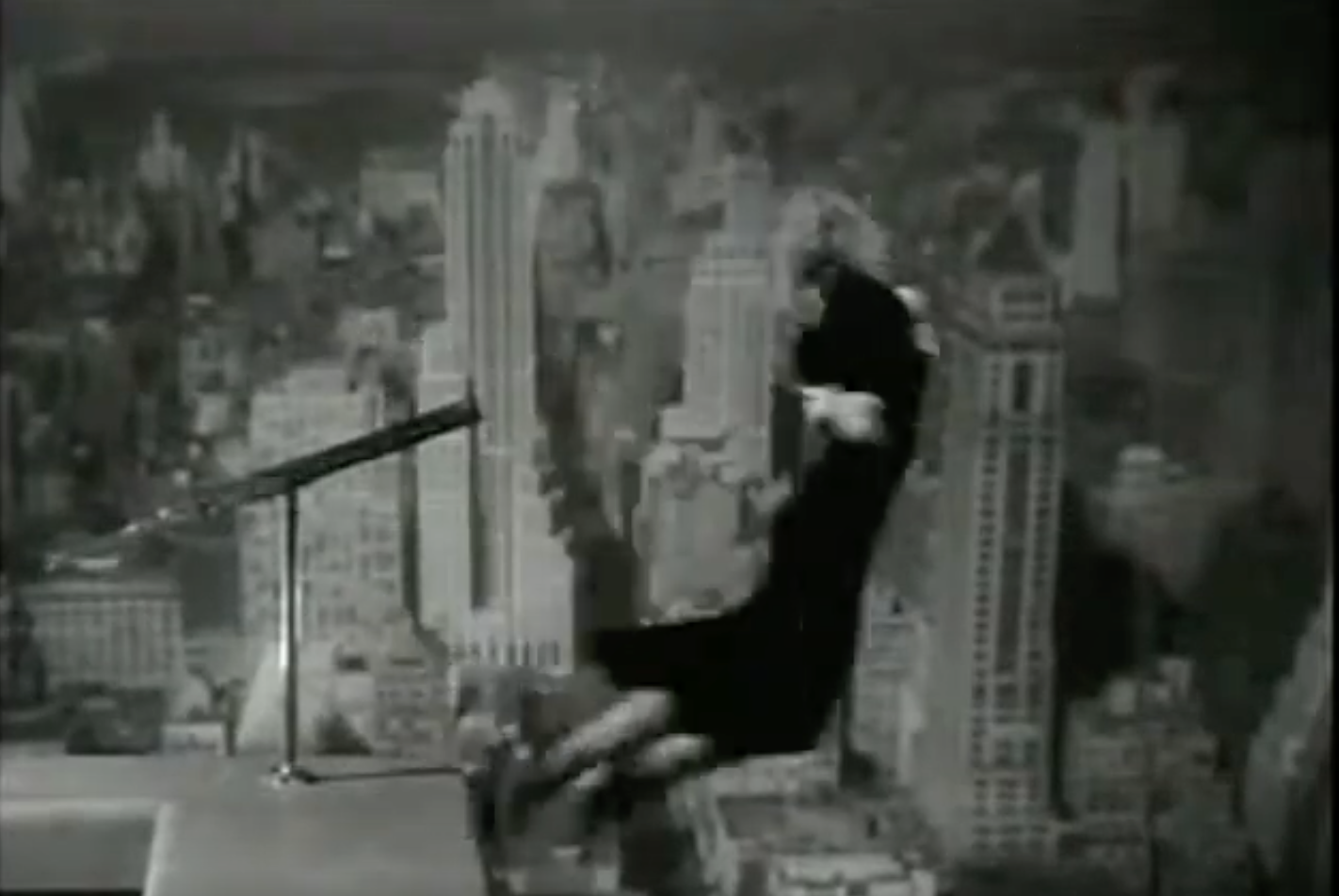Whatever Became of Mahmoud Hassan Pasha?
One of my poems, “Evelyn McHale Chooses the Tallest Building in the City,” an epic at five pages, includes a brief section about Mahmoud Hassan Pasha, the Egyptian delegate to the U.N. during 1947’s now hyper-topical special session on the Partition of Palestine.
To date, working on that poem is the closest I’ve come to writing poetry in a febrile Coleridge dream state. I lovingly immersed myself in it at every waking moment, for eight straight weeks in February and March of 2021; it’s one of the few poems that appears in both my collections.
I admit the section on Pasha is a curious interlude; the poem is made up of 74 couplets, and 68 of those couplets are about Evelyn McHale, a 23-year-old bookkeeper who committed suicide in spectacular fashion by jumping from the observation deck of the Empire State Building on May 1, 1947. Known in inimitable mid-20th century U.S.-tabloid-poetry as “the Beautiful Suicide,” McHale was the subject of a famous and arresting LIFE magazine photograph, lying in elegant repose in her pearls and white gloves; she’s seemingly asleep or unscathed from her dramatic leap (if it wasn’t for the demolished limousine serving as her funeral bier, and her shoeless feet.)
Originating as an ekphrasis of that photo, “Evelyn McHale Chooses the Tallest Building in the City” blossomed into an attempt at writing a Shirley Jackson short story along the lines of her 1957 story “The Missing Girl” or her 1951 novel Hangsaman, both prompted by Jackson’s obsession with the true story of Bennington college student Paula Jean Weldon, who mysteriously disappeared in 1946.
Hassan Pasha made it into my poem at the last minute. After weeks of researching McHale (tracking down family trees and contemporaneous records), writing her story in couplets (a speedy storytelling conceit I copied from poet Ross Gay’s flowing book-length poem about watching video of Dr. J Julius Erving’s famous NBA-finals-baseline-reverse layup), and then revising and revising, I decided it was time to cut off the obsession and finish the poem. My then-girlfriend, who I was quarantined with at the time, was tired of hearing about McHale; I was triangulating train timetables at 3 am, trying to track McHale’s exact movements on the day of her suicide. But I knew the poem wasn’t finished. Or more accurately, even though I decided I was done, I was still obsessing.
It was then that an easy research trope led me to Pasha.
One of the characters in my poem was the limousine driver who was fortuitously at a nearby drug store when McHale, like a Poseidon bolt, totaled his parked limo on W. 34th St. I had been captivated by the mention he got in the May 2 New York Times page 23 brief on McHale’s death, particularly liking the rhyme/slant rhyme rhythm of near-by/thereby/injury. “The driver was/ in a near-by drug store, thereby/ escaping death or serious injury,” which I turned into this couplet: “The chauffeur knew a drug store coffee counter/nearby, thereby he was free.” I figured he was probably reading a paper at that drug store counter, so, I looked up the May 1, 1947 New York Times to see if I could add some color to his cameo. Maybe some President Truman news would give the poem a dash of late 1940s verisimilitude.
Of course: What I found blaring at me from the PDF was a triple decker headline about the Israeli/Palestinian conflict: “Arabs Defeated, 8-1, In U.N./After Long Wrangle on Bid/For Independence Debate.” By of course, I mean God dammit. Obviously, my situation isn’t akin to being on the ground in Palestine or Israel, but as a progressive American Jew, this conflict has dogged me my whole life. P.s. High school history class and college campuses were unnerving for Jews back in the 1980s too, thanks to Israel.
God dammit because: Here I was experiencing my first euphoric, out-of-body, creative experience as a beginning poet, and once again, there’s no escaping Palestine for Josh. There was nothing to do but embrace it. And to be honest, it immediately felt right to do so. If I had to wrestle with this mindfuck tragedy my whole life, well then so did my epic poem. (I also took it as a good sign when it turned out the limo was a U.N. limo.)
With all the SDOT and YIMBY prompts that seem to score my poems, it’s actually idyllic 1940s Gotham, not 21st century bike lanes, that animate my poetry. This is how I justified dedicating five pages of my chapbook Night of Electric Bikes to an account from sepia-toned Manhattan. For me, 1947—with its rattling subways, industrial waterfronts, and Billie Holiday gigs in 52nd St. basement nightclubs—defines the cities of my imagination. Similarly, the Third World/First World politics of the 75-year-old Israeli/Palestinian conflict still defines our current political setting, where students champion the “intersectional” causes of the oppressed against corporate capitalism, structural racism, and gentrification or its doppelganger, “colonialism.” I must say, while I’m committed to the fight for equity and the fight against social injustice, I find echoes of the right’s dangerous nostalgia for “real” America in the left’s fetish for authenticity; Lydia Polgreen wrote an insightful essay about this in February. However, that doesn’t diminish my sense that 1947 is closer than it appears in the rearview mirror.
The pg. 2 jump, New York Times, Thursday, May 1, 1947. Mahmoud Hassan Pasha in striped jacket.
The Thursday, May 1st, 1947 New York Times account of the now-historic U.N. session casts Pasha, who saw where partition was headed, as the main character; he’s pictured in a striped suit jacket—alongside his non-aligned Indian delegate ally—on the page 2 jump. As the only Arab delegate on the special General Committee that drew up the agenda for the coming full assembly session, Pasha is trying to head off partition with an alternative measure for Palestinian independence; in his frustrated mission, he seems like someone trying to find a vegetarian option on the menu at a steakhouse. His direct quotes (along with the NYT’s paraphrasing) are accordingly tongue-tied. “Mahmoud Hassan Pasha, Egyptian Ambassador, announced however, that he had no authority to withdraw the proposal. He explained that he could only say he would not ‘insist on a vote here.’”
The somewhat confusing front-page article, which catches the week’s action midstream, led me to the U.N. session’s parliamentary notes; they are clearer, though also poetically awkward. “The Egyptian representative stated that he was prepared not to insist on a vote at that time, though, in reply to a question from the Chairman, he stated that he had no authority to withdraw the proposal.”
Soon, I was as obsessed with Pasha’s story as I was with McHale’s.
Adding to my obsession: Despite Pasha’s front-page NYT role at the beginning of the deliberations, by the time the partition comes to a final vote in November, 1947, he is nowhere to be found. When the Arab delegation walks out in protest, the NYT story mentions neither Egypt nor Pasha, though Egypt is on record voting No.
Again, under the influence of Ross Gay’s Dr. J poem—it shifts dramatically away from Dr. J into verse about other images, such as black and white photo of a boy wearing an aviator cap during the sharecropping era of the 1930s—I found permission to point my poem’s lens elsewhere.
Here’s the Mahmoud Hassan Pasha section, starting with a segue at couplet #21:
Which gives us an opportunity to cross the East River,/ and go to Queens to the UN at Flushing Meadows,/
where the Egyptian ambassador/ has been speaking in riddles./
—“I am prepared not to insist on a vote at this time,” Mahmoud Hassan/ Pasha said, but “I will not withdraw my proposal.”/
The General Committee remained/ bewildered, adjourning/
at 12:03 in the morning, May 1, 1947/ Hassan Pasha was becoming non-aligned./
The UN reconvened at 10 am. With just cause, Hassan Pasha/ reintroduced his proposal./
The termination of the mandate over Palestine. The declaration of/ independence./
The UN President said it couldn’t be voted on/ because it no longer existed.—
Mahmoud Hassan Pasha, who, as far as I can tell, also “no longer existed” after 1947, has remained an intriguing character for me; I find myself looking for him in the pages of Naguib Mahfouz’s Cairo Trilogy novels, which take place against the backdrop of political Cairo in the early 20th century. Or: I daydream that he slipped out of the U.N. building in defeat and walked into Manhattan, where he has been freewheeling in his dashing striped suit jacket ever since, going to bookstores, and art galleries, and seeing lectures at the 92nd St. Y.
A recent poem I wrote begins:
Manhattan. Missing. Last seen/ on the front page, May 1, 1947, the Egyptian ambassador who voted no on partition./ The actress speaking to the gales in pre-Code./ Skyscraper Souls. Skyscraper Souls is a 1932 pre-code movie where the tragic heroine leaps to her death from the ledge of the (fictitious) newest tallest Manhattan skyscraper; the Empire State Building opened in the spring of 1931.
Hollywood star Verree Teasdale as Sarah Dennis leaps to her death in the 1932 MGM movie Skyscraper Souls.
In my idealism, I think the Jews were wrong to advocate for partition and the Arabs were wrong to vote against it. Both sides were wrong for the same reason: nativist tribalism. Although, it looked impossible at the time, I believe in a one state solution for two indigenous peoples. The argument against that idea was that divvying up the land would prevent bloodshed. I’ll just let that hang there.



